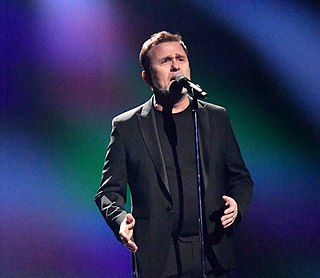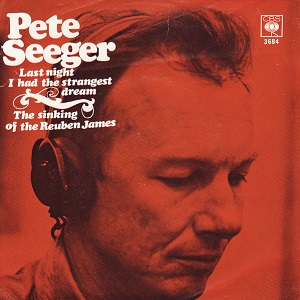Related Research Articles

Agnetha Åse Fältskog is a Swedish singer, songwriter, musician and actress. She achieved success in Sweden after the release of her debut album Agnetha Fältskog in 1968, and reached international stardom as a member of the pop group ABBA, which has sold over 380 million albums and singles worldwide, making them one of the best-selling music artists in history.

"Waterloo" is the first single from the Swedish pop group ABBA's second album, Waterloo, and their first under the Epic and Atlantic labels. This was also the first single to be credited to the group performing under the name ABBA.

Elva kvinnor i ett hus is the fifth studio album by Swedish pop singer Agnetha Fältskog, released on 1 December 1975 by Cupol Records.
"Green, Green Grass of Home", written by Claude "Curly" Putman Jr. and first recorded by singer Johnny Darrell in 1965, is a country song made popular by Porter Wagoner the same year, when it reached No. 4 on the country chart. It was also recorded by Bobby Bare and by Jerry Lee Lewis, who included it in his album Country Songs for City Folks. Tom Jones learned the song from Lewis' version, and in 1966, he had a worldwide No. 1 hit with it.

"Det vackraste" is a Swedish love song. It was originally sung by Swedish pop singer Cecilia Vennersten and finished second in the Melodifestivalen 1995, the Swedish selections for Eurovision Song Contest. The song was released as a single and stayed 47 weeks in the Swedish singles chart total, including seven weeks at number-one. It also stayed at Svensktoppen for 26 weeks during the period 29 April-21 October 1995, with 3rd place as best result there. The song was awarded a Swedish Grammy Award, Grammis, for Best Song of 1995. In Norway, "Det vackraste" peaked at number 2.

"Invincible" is the name of the 2006 Eurovision Song Contest entry from Sweden, sung by Carola Häggkvist. Being one of the favourites to win, it ended up finishing 5th out of 24.

Jan Christian Johansen is a Swedish singer, best known for representing Sweden in the Eurovision Song Contest 1995.

"Colorado" was the Dutch entry in the Eurovision Song Contest 1979, performed in Dutch by the six-piece group Xandra, fronted by Sandra Reemer.
Frida Svensson is a Swedish track and field athlete who competed in the 400 metres hurdles. She represented Sweden at the IAAF World Championships in Athletics on three occasions, qualifying for the semifinals in both Tokyo 1991 and Stuttgart 1993. She also reached the semifinals of the women's 400 metres hurdles at the 1992 Barcelona Olympics.

"This Moment" is a ballad that was released as the debut single of Marie Picasso, the winner of the fourth series of the Swedish singing competition Idol in 2007. The song was written by Swedish songwriters Mårten and Lina Eriksson, and produced by the former. The song debuted and peaked at number one on the Swedish Singles Chart, holding the top spot for two consecutive weeks. It was certified double platinum for sales of over 40,000 copies.

"La voix" is a song by Swedish singer Malena Ernman, and was the Swedish entry at the 2009 Eurovision Song Contest, held in Moscow, Russia. It was composed by Fredrik Kempe, with lyrics by both Kempe and Ernman. It is the first Swedish entry to contain lyrics in French, as well as being the last Swedish entry to have contained lyrics in another language than English.

"Is Anybody Goin' to San Antone" is a song written by Glenn Martin and Dave Kirby, and recorded by American country music artist Charley Pride.

"Solsken" ("Sunshine") is a single by Swedish pop group Gyllene Tider. Written by the band's lead singer Per Gessle, it was released on 29 September 2004 as the second single from Finn 5 fel!, which was the best-selling album in Sweden during 2004. The single peaked at number 20 on the Swedish singles chart, becoming the thirteenth single by the band to chart in their home country and became a new entry at number five on the Svensktoppen before peaking at number three a week later.
Kommer tid, kommer vår is a song with music by Jon van der Bring and lyrics Fredrik Möller. The song is intended to be sung as a vocal duet.

I Love Europe is a song written by Torgny Söderberg and Magnus Johansson, with lyrics by Ingela "Pling" Forsman. The song was performed by Christer Sjögren at Melodifestivalen 2008. On 9 February 2008 the song headed directly from the semifinal inside Scandinavium in Gothenburg to the final in the Stockholm Globe Arena on 15 March that year. Once there, the song ended up 9th. Magnus Johansson also appeared as a trumpeter. The song lyrics describes the dream of friendship and peace all across Europe, and compares the nations with one big family.

"Lena Anthem" is a song by Swedish singer Lena Philipsson from her ninth studio album Det gör ont en stund på natten men inget på dan (2004). It was released as the album's third single on 11 October 2004 through Columbia and Sony Music. Written by Thomas "Orup" Eriksson and produced by Anders Hansson, "Lena Anthem" is a disco song with synthesizer instrumentation and interpolations of Philipsson's 1987 single "Dansa i neon". Lyrically, the song contains exaggerated and tongue-in-cheek statements that proclaim her greater than her rivals.

"När vi två blir en", written by Per Gessle, also known by the refrain's opening line "Jag vill känna din kropp emot min", is a song with lyrics describing teenage love, released as a single on 29 October 1980 by pop group Gyllene Tider. Göran Fritzson wrote the Farfisa intro and the hook. Gyllene Tider also recorded the song with lyrics in English, as "Beating Heart", releasing it as a promotional single on 1 September 1981 using the group name Modern Times.
När vi gräver guld i USA also known with its English language title "When We Dig for Gold in the USA" was a song which was used as fight song for the Swedish national team during the 1994 FIFA World Cup in the United States, where Sweden ended up third. During the Grammis Awards for 1994, it won the category "Song of the year 1994".

"Delirium" is a song by Swedish singer Lena Philipsson from her ninth studio album Det gör ont en stund på natten men inget på dan (2004). It was released as the album's second single on 7 July 2004 through Columbia and Sony Music. Written by Thomas "Orup" Eriksson and produced by Anders Hansson, "Delirium" is a disco and power pop song with synthesizer and guitar instrumentation and schlager influences.

"Last Night I Had the Strangest Dream" is a song written by American Folk Singer-songwriter Ed McCurdy in 1950. Due to McCurdy's connection with fellow musicians, it was common in repertoires within the folk music community. The song had its first album release when Pete Seeger recorded it as "Strangest Dream" for his 1956 album Love Songs For Friends & Foes. Seeger would later re-visit the song for his 1967 album Waist Deep in the Big Muddy and other Love Songs. The strong anti-war theme of the song led it to be recorded by multiple other artists, including The Weavers (1960), Joan Baez (1962), The Kingston Trio (1963), Simon & Garfunkel (1964), and Johnny Cash who released two versions of the song during the 2000's.